Disclosure: Meeple Mountain received a free copy of this product in exchange for an honest, unbiased review. This review is not intended to be an endorsement.
One of the things that surprise me about board games is the lack of oceanic settings. Sure there are games like Abyss, Reef, Kingdoms of the Deep, and Deep Blue but really they’re just drops in the tabletop Oceans. Exploration is a popular theme in games, and we have seen plenty of games use space, planets, and undiscovered lands as the backdrop. According to Oceana.org, more than 80% of the ocean remains unexplored. With a number like that, it opens an opportunity to create all sorts of fantastical nonsense using the deep blue as a backdrop. Today’s game, Aquatica, does precisely that.
The funny thing about this one is that I only recently learned about its existence. According to the marketing blurb, Aquatica wants to be a one-hour family-oriented hand builder. Hand building means the cards you acquire throughout the game go into your hand. There is no tableau or deck to build here. You simply play a card, do what it says, and your turn is done. Any played cards go to your personal discard pile, and you need to play your Matrona card to get the discard pile back into your hand.

Deep Water Monarchy
Throughout the game, you will be acquiring recruits to add to your hand and grabbing location cards to put them into your personal board slots. You gain location cards by either sheer military power or using money to buy them out. How American.
You are doing all of these things because you are a Sea King, and like any other noteworthy empire, you want locations to exploit. In this case, for points, because what else would it be in a board game?
Everyone will start with the same hand of cards and four trained manta rays, each with certain special effects. On the central board, you have your row of recruits with their cost underneath them as well as the available location cards to grab. At the very top of the board, there are four goals that players will try to achieve. The earlier you achieve your goal, the more points you score. Yes, this is a race.
Turns are simple. You have your main action and additional actions. The card you play is the main action, telling you precisely what you will do. If it says recruit a character, pay the gold and grab the recruit to add it to your hand. Conquer a location means using your military power to take over a location card. Buying location cards requires you to use gold to grab them. Both the military power and gold do not carry from turn-to-turn, so any carryover is lost. Scouting is an optional effect that lets you discard some location cards and bring in new ones. Additionally, you can flip your manta rays to get effects such as a gold bonus, reclaim discarded cards, or gain military power. The other additional action is exploiting a location card.
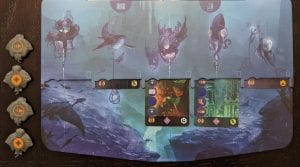
Staying Salty
Most location cards have depth levels, with most levels giving some sort of benefit similar to the manta rays. When you take a location card from the central board, you slide it into one of the five location slots on your player board, with the top depth level exposed. As you exploit these locations for their one-time benefits, you physically slide the card to the next depth level. Once the location card has reached the bottom, it is ready to be removed from your board and scored. To do that, you must play a card that allows you to score fully exploited location cards.
This entire system lacks restraint, which makes it exciting. Only one card can be played as your main action. However, you can take as many additional actions as you want before or after playing your card. Nothing is stopping you from flipping all of your manta rays or exploiting all of the locations. The intrigue here is the effects you exploit are one-time use. Because of this setback, you are continually evaluating the options available to you and debating with your brain cells about the best option for these scarce benefits. Like any good game, it’s a struggle with no definitive answer.
To make the puzzle even more challenging, some of the depth levels are blank. You cannot exploit them, and your only option is to use the Raise Level effect from either your recruits, manta rays, or locations. It forces the location card to move forward, and you can use them even if there is an effect. However, forcing a location card to move downwards by Raise Level instead of exploit means you skip over the effect, thus introducing an opportunity cost dilemma. As if that weren’t enough, some location cards will reward you with a permanent wild manta ray when you score them, giving you more options on top of your four starting manta rays. When you achieve a goal, such as having at least three location cards scored, you must sacrifice one of your starting manta rays to claim it. Decisions, decisions.
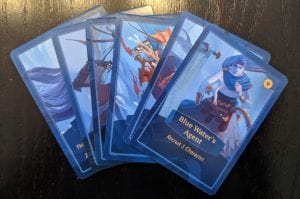
Getting Shipfaced
The systems and mechanisms in place lead everyone towards the creation of their underwater factory. In the early game, you will play one card to do one or two particular actions. As the game progresses, a single card will trigger a gradient of back-to-back actions that make sweeping changes to the board state. As you slide that location card one more spot or flip yet another manta ray to complete your goal, you can almost hear the grinding of the pistons thrusting you forward.
On top of all of this, you start building a narrative identity in this theme of monarchs seizing locations. Maybe your game plan is to conquer as many location cards as you can with an iron fist like a scuba diving Darth Vader and his pet shark Meg. Meanwhile, Jen over there is stacking Raise Level manta rays, giving little care to the exploit effects, and wants to go through her locations like Paul Bunyan in a forest.
All of this sounds complicated and messy, but it’s a surprisingly clean experience that lasts less than an hour. It does lead to a common complaint I hear from naysayers, claiming Aquatica is too short. I cannot understand this game length fetishization, especially for games with straightforward mechanisms like this one. Games going through the same gameplay loop hours on end are a chore to play; it’s like watching a movie with overwritten dialog. I’m looking at you, Terraforming Mars and Gaia Project.
Don’t Get Tide Down
Aquatica works because it knows its place. Turns are snap turtle quick, and the decisions are compelling but not mentally taxing. It bows out of the stage at the perfect time instead of overstaying its welcome. Is it my favorite short card game? That crown still belongs to Res Arcana. Although, I would pick this over Res Arcana if I don’t want to throw my brain into the nearest tumble dryer. Res Arcana is a great game, but you have to be mentally alert and surrounded by a platoon of empty coffee cups to be good at it. Aquatica still makes you think about your plays, although it won’t be as engrossing as some of the heavier card games out there.
If replayability is a concern, this game does have an advanced mode that throws a few variables your way. Besides the usual character and location deck shuffle, you also have random goals such as recruiting a 3 gold cost character, or have 4 different types of location cards in your scoring pile. There are also King Cards, which everyone starts out with, giving everyone a unique power.
I wish the same care and effort that went into the design of this game was also carried over to the components. Arcane Wonders is not known for compromising quality like this, which is why I am surprised that I wrote that last sentence. The cards are thin with almost no finish, suggesting that repeat plays will likely mark the cards. Sleeving is not an option since the player mats come with ridges for the discard pile. Another slight disappointment is the complete absence of player references. The game has a lot of different icons and effects that could be challenging for new players.
If my only major complaint about the game is its components, it should tell you a lot about how I feel about the game. Aquatica deserves a seat at the family card game table for its stellar performance. It is an entertaining experience with thought-provoking decisions that anyone can get into without exhausting their minds. This is an example of a game with light rules yet enough density to keep you engaged.
You can purchase a copy of Aquatica on Amazon US


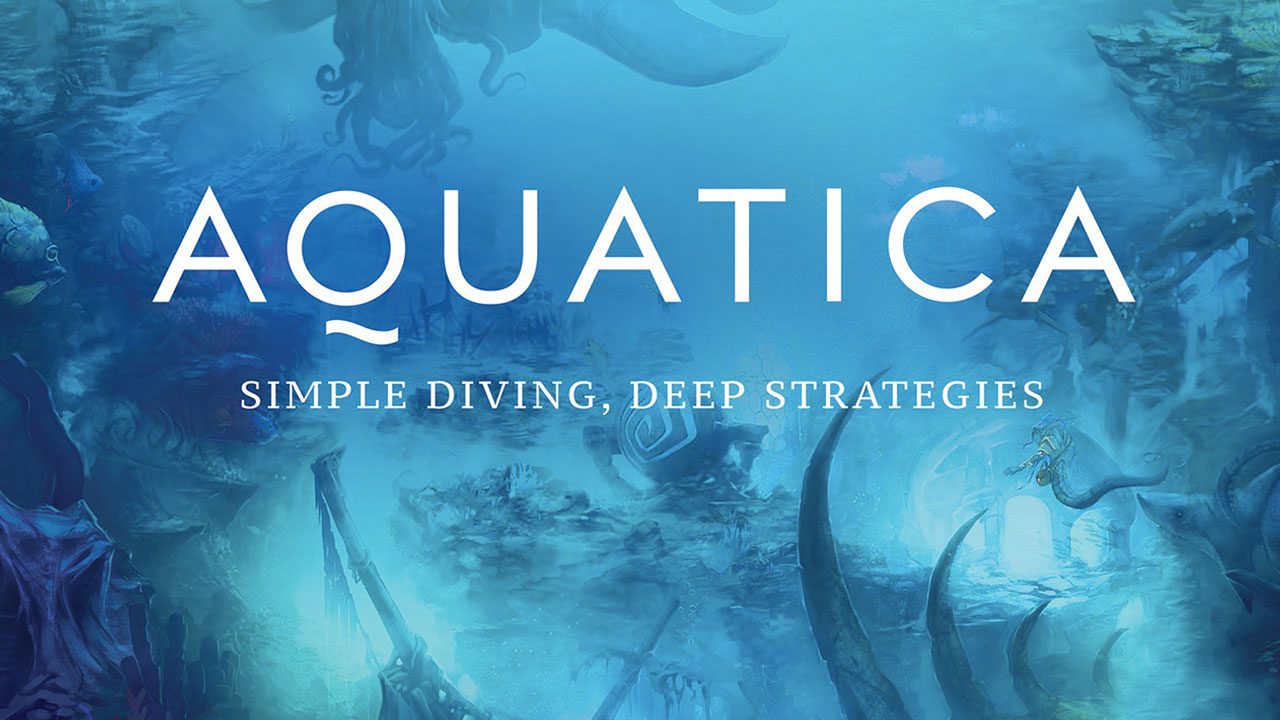

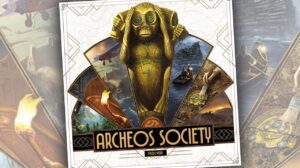
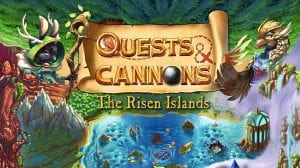





Wow! This game sounds amazing and right up my alley! I am quite sure the family would enjoy this one, so chalk up on sale of this game to you, sir.